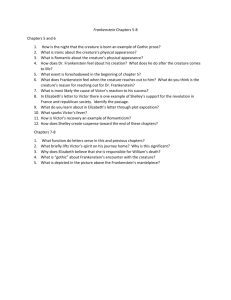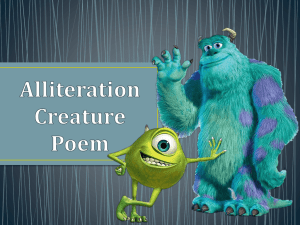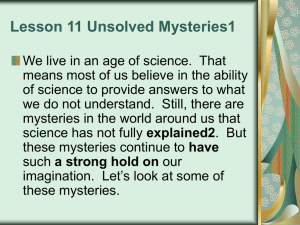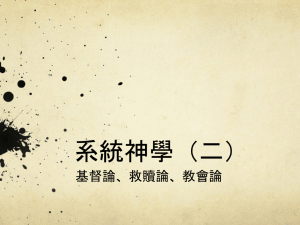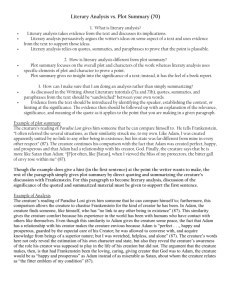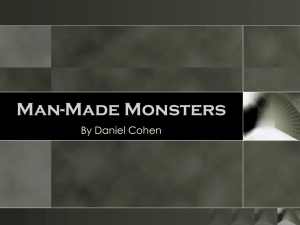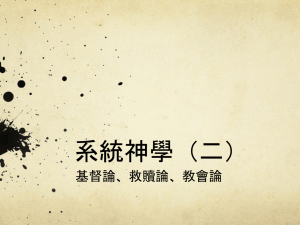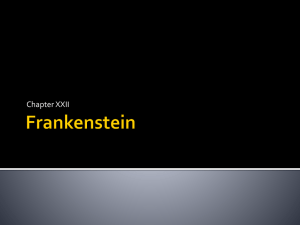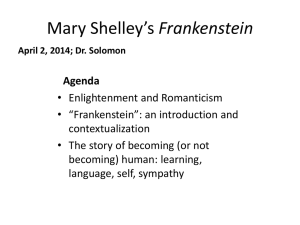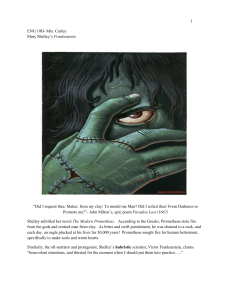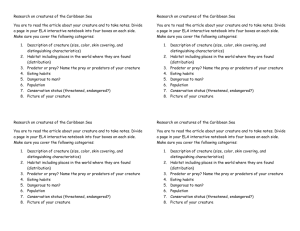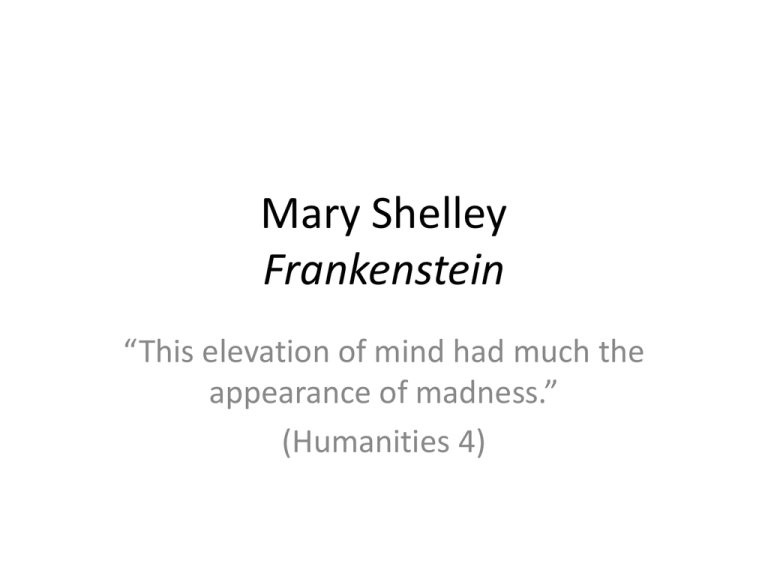
Mary Shelley
Frankenstein
“This elevation of mind had much the
appearance of madness.”
(Humanities 4)
Shelley
• 1797-1851
• Daughter of Mary
Wollstonecraft &
William Godwin
• Married to Percy
Bysshe Shelley
• Frankenstein & The
Last man
2
Or
• “A Modern Prometheus”
• Did I request thee, maker, from my clay
• To mould me man? Did I solicit thee
• From darkness to promote me?—
3
• Walton: “I feel my heart glow with an enthusiasm which elevates me to
heaven, for nothing contributes so much to tranquillize the mind as a
steady purpose—a point on which the soul may fix its intellectual eye.”
(16)
– “I was easily led by the sympathy which he evinced to use the language of my
heart, to give utterance to the burning ardour of my soul and to say, with all
the fervour that warmed me, how gladly I would sacrifice my fortune, my
existence, my every hope, to the furtherance of my enterprise. One man's life
or death were but a small price to pay for the acquirement of the knowledge
which I sought, for the dominion I should acquire and transmit over the
elemental foes of our race. As I spoke, a dark gloom spread over my listener's
countenance. At first I perceived that he tried to suppress his emotion; he
placed his hands before his eyes, and my voice quivered and failed me as I
beheld tears trickle fast from between his fingers; a groan burst from his
heaving breast.
• I paused; at length he spoke, in broken accents: "Unhappy man! Do you
share my madness? Have you drunk also of the intoxicating draught? Hear
me; let me reveal my tale, and you will dash the cup from your lips!”” (29)
4
• “You seek for knowledge and wisdom, as I once did; and I ardently hope
that the gratification of your wishes may not be a serpent to sting you, as
mine has been.
– I do not know that the relation of my disasters will be useful to you; yet, when
I reflect that you are pursuing the same course, exposing yourself to the same
dangers which have rendered me what I am, I imagine that you may deduce
an apt moral from my tale, one that may direct you if you succeed in your
undertaking and console you in case of failure. Prepare to hear of occurrences
which are usually deemed marvellous.
• Were we among the tamer scenes of nature I might fear to encounter your
unbelief, perhaps your ridicule; but many things will appear possible in
these wild and mysterious regions which would provoke the laughter of
those unacquainted with the ever-varied powers of nature; nor can I
doubt but that my tale conveys in its series internal evidence of the truth
of the events of which it is composed.”(31)
5
Young Frankenstein
• “I was their plaything and their idol, and something
better—their child, the innocent and helpless creature
bestowed on them by heaven, whom to bring up to
good, and whose future lot it was in their hands to
direct to happiness or misery, according as they
fulfilled their duties towards me.” (35)
– “[I] looked upon Elizabeth as mine—mine to protect, love,
and cherish. All praises bestowed on her I received as
made to a possession of my own. We called each other
familiarly by the name of cousin. No word, no expression
could body forth the kind of relation in which she stood to
me—my more than sister, since till death she was to be
mine only.” (37)
6
• “The world was to me a secret which I desired to divine. Curiosity,
earnest research to learn the hidden laws of nature, gladness akin
to rapture, as they were unfolded to me, are among the earliest
sensations I can remember.” (38)
– “It was the secrets of heaven and earth that I desired to learn; and
whether it was the outward substance of things or the inner spirit of
nature and the mysterious soul of man that occupied me, still my
inquiries were directed to the metaphysical, or in its highest sense, the
physical secrets of the world.” (39)
• “Wealth was an inferior object, but what glory would attend the
discovery if I could banish disease from the human frame and
render man invulnerable to any but a violent death!” (42)
– Mysticism Alchemy Natural science
7
• "The ancient teachers of this science," said he, "promised
impossibilities and performed nothing. The modern masters
promise very little; they know that metals cannot be transmuted
and that the elixir of life is a chimera but these philosophers, whose
hands seem only made to dabble in dirt, and their eyes to pore over
the microscope or crucible, have indeed performed miracles.
– They penetrate into the recesses of nature and show how she works in
her hiding-places. They ascend into the heavens; they have discovered
how the blood circulates, and the nature of the air we breathe. They
have acquired new and almost unlimited powers; they can command
the thunders of heaven, mimic the earthquake, and even mock the
invisible world with its own shadows.”
• Such were the professor's words—rather let me say such the words
of the fate—enounced to destroy me. (49)
8
• “None but those who have experienced them can conceive of the
enticements of science. In other studies you go as far as others
have gone before you, and there is nothing more to know; but in a
scientific pursuit there is continual food for discovery and wonder.”
(51-52)
– Taboo & transgression: “The dissecting room and the slaughter-house
furnished many of my materials; and often did my human nature turn
with loathing from my occupation, whilst, still urged on by an
eagerness which perpetually increased, I brought my work near to a
conclusion.” (55-56)
• “Learn from me, if not by my precepts, at least by my example, how
dangerous is the acquirement of knowledge and how much happier
that man is who believes his native town to be the world, than he
who aspires to become greater than his nature will allow.” (54)
9
• “A human being in perfection ought always to preserve a calm and
peaceful mind and never to allow passion or a transitory desire to
disturb his tranquillity. I do not think that the pursuit of knowledge
is an exception to this rule.
– If the study to which you apply yourself has a tendency to weaken
your affections and to destroy your taste for those simple pleasures in
which no alloy can possibly mix, then that study is certainly unlawful,
that is to say, not befitting the human mind.
• If this rule were always observed; if no man allowed any pursuit
whatsoever to interfere with the tranquillity of his domestic
affections, Greece had not been enslaved, Caesar would have
spared his country, America would have been discovered more
gradually, and the empires of Mexico and Peru had not been
destroyed.” (56)
10
• “I had desired it with an ardour that far
exceeded moderation; but now that I had
finished, the beauty of the dream vanished,
and breathless horror and disgust filled my
heart. Unable to endure the aspect of the
being I had created, I rushed out of the room
and continued a long time traversing my bedchamber, unable to compose my mind to
sleep.”
11
Travels with Clerval
• “I remember the first time I became capable of observing
outward objects with any kind of pleasure, I perceived that
the fallen leaves had disappeared and that the young buds
were shooting forth from the trees that shaded my
window. It was a divine spring, and the season contributed
greatly to my convalescence.” (63)
– Nature, travel, friendship
• “We returned to our college on a Sunday afternoon: the
peasants were dancing, and every one we met appeared
gay and happy. My own spirits were high, and I bounded
along with feelings of unbridled joy and hilarity.” (72)
– Does he deserve this?
12
Murder of William
• “Two years had now nearly elapsed since the night on
which he first received life; and was this his first crime?
Alas! I had turned loose into the world a depraved wretch,
whose delight was in carnage and misery; had he not
murdered my brother?
– No one can conceive the anguish I suffered during the
remainder of the night, which I spent, cold and wet, in the open
air. But I did not feel the inconvenience of the weather; my
imagination was busy in scenes of evil and despair.” (78)
• Justine convicted: “The tortures of the accused did not
equal mine; she was sustained by innocence, but the fangs
of remorse tore my bosom and would not forgo their hold.”
(86)
– Vanity & suffering
13
• “Remember that I am thy creature; I ought to be thy
Adam, but I am rather the fallen angel, whom thou
drivest from joy for no misdeed. Everywhere I see bliss,
from which I alone am irrevocably excluded. I was
benevolent and good; misery made me a fiend. Make
me happy, and I shall again be virtuous.”
– "Begone! I will not hear you. There can be no community
between you and me; we are enemies. Begone, or let us
try our strength in a fight, in which one must fall.”
• For the first time, also, I felt what the duties of a
creator towards his creature were, and that I ought to
render him happy before I complained of his
wickedness. (103-104)
14
• The creature is born conscious, & immediately
clothes himself (105)
– Awareness, shame, Eden
– Is reason blessing?
15
The House in the Forest
• Beauty
– “The young girl was occupied in arranging the cottage; but
presently she took something out of a drawer, which employed
her hands, and she sat down beside the old man, who, taking up
an instrument, began to play and to produce sounds sweeter
than the voice of the thrush or the nightingale. It was a lovely
sight, even to me, poor wretch who had never beheld aught
beautiful before.” (110)
• Love & belonging
– “What chiefly struck me was the gentle manners of these
people, and I longed to join them, but dared not.” (113)
• Love & Romance
– Safie
16
The House in the Forest
• "I had admired the perfect forms of my
cottagers—their grace, beauty, and delicate
complexions; but how was I terrified when I
viewed myself in a transparent pool! At first I
started back, unable to believe that it was indeed
I who was reflected in the mirror; and when I
became fully convinced that I was in reality the
monster that I am, I was filled with the bitterest
sensations of despondence and mortification.
Alas! I did not yet entirely know the fatal effects
of this miserable deformity.”
– Rousseau: self-awareness & comparison
17
Education of the Creature
• Plutarch’s Lives
– Virtue and heroism
• Werther
– I thought Werter himself a more divine being than I had ever beheld or
imagined; his character contained no pretension, but it sank deep. The
disquisitions upon death and suicide were calculated to fill me with
wonder. I did not pretend to enter into the merits of the case, yet I
inclined towards the opinions of the hero, whose extinction I wept,
without precisely understanding it.
– "As I read, however, I applied much personally to my own feelings and
condition. I found myself similar yet at the same time strangely unlike
to the beings concerning whom I read and to whose conversation I
was a listener. sympathized with and partly understood them, but I
was unformed in mind; I was dependent on none and related to
none.” (131)
18
Education of the Creature
• Paradise Lost
– “Like Adam, I was apparently united by no link to any other
being in existence; but his state was far different from
mine in every other respect. He had come forth from the
hands of God a perfect creature, happy and prosperous,
guarded by the especial care of his Creator; he was
allowed to converse with and acquire knowledge from
beings of a superior nature, but I was wretched, helpless,
and alone. Many times I considered Satan as the fitter
emblem of my condition, for often, like him, when I viewed
the bliss of my protectors, the bitter gall of envy rose
within me.” (132)
• “Increase of knowledge only discovered to me more
clearly what a wretched outcast I was.” (133)
19
• Driven from the house by Felix
– “Felix” = “happy”
• Shot for saving a drowning girl
– “This was then the reward of my benevolence! I had saved a human
being from destruction, and as a recompense I now writhed under the
miserable pain of a wound which shattered the flesh and bone. The
feelings of kindness and gentleness which I had entertained but a few
moments before gave place to hellish rage and gnashing of teeth.
Inflamed by pain, I vowed eternal hatred and vengeance to all
mankind.” (143)
• Killing William
– “I gazed on my victim, and my heart swelled with exultation and
hellish triumph; clapping my hands, I exclaimed, 'I too can create
desolation; my enemy is not invulnerable; this death will carry despair
to him, and a thousand other miseries shall torment and destroy
him.’” (145)
– War against the creator
20
Bride of Frankenstein
• “His words had a strange effect upon me. I compassionated him
and sometimes felt a wish to console him, but when I looked upon
him, when I saw the filthy mass that moved and talked, my heart
sickened and my feelings were altered to those of horror and
hatred.”
– “My vices are the children of a forced solitude that I abhor, and my
virtues will necessarily arise when I live in communion with an equal. I
shall feel the affections of a sensitive being and become linked to the
chain of existence and events from which I am now excluded.”
• “Mine shall not be the submission of abject slavery. I will revenge
my injuries; if I cannot inspire love, I will cause fear, and chiefly
towards you my arch-enemy, because my creator, do I swear
inextinguishable hatred. Have a care; I will work at your destruction,
nor finish until I desolate your heart, so that you shall curse the
hour of your birth.” (148-150)
– Solitude & misery
21
Travels with Clerval
• “The mountains of Switzerland are more majestic and
strange, but there is a charm in the banks of this divine
river that I never before saw equalled. Look at that castle
which overhangs yon precipice; and that also on the island,
almost concealed amongst the foliage of those lovely trees;
and now that group of labourers coming from among their
vines; and that village half hid in the recess of the
mountain.
– Oh, surely the spirit that inhabits and guards this place has a
soul more in harmony with man than those who pile the glacier
or retire to the inaccessible peaks of the mountains of our own
country.” (161)
• Happiness as the ordinary, the natural, and the harmonious
22
Broken Promise
• "Devil, cease; and do not poison the air with these
sounds of malice. I have declared my resolution to you,
and I am no coward to bend beneath words. Leave me;
I am inexorable.”
– "It is well. I go; but remember, I shall be with you on your
wedding-night.”
• I shuddered to think who might be the next victim
sacrificed to his insatiate revenge. And then I thought
again of his words—‘I will be with you on your wedding
night.’ That, then, was the period fixed for the
fulfilment of my destiny. In that hour I should die and
at once satisfy and extinguish his malice. (174)
– Vanity & egoism
23
• “They were my brethren, my fellow beings, and I
felt attracted even to the most repulsive among
them, as to creatures of an angelic nature and
celestial mechanism. But I felt that I had no right
to share their intercourse. I had unchained an
enemy among them whose joy it was to shed
their blood and to revel in their groans. How they
would, each and all, abhor me and hunt me from
the world did they know my unhallowed acts and
the crimes which had their source in me!” (189)
– The monster’s revenge is not only murder
24
• “Sweet and beloved Elizabeth! I read and reread
her letter, and some softened feelings stole into
my heart and dared to whisper paradisiacal
dreams of love and joy; but the apple was already
eaten, and the angel's arm bared to drive me
from all hope. Yet I would die to make her happy.
If the monster executed his threat, death was
inevitable; yet, again, I considered whether my
marriage would hasten my fate.” (193)
– Who is fallen from grace? How?
– Parallels between maker and monster
25
• “I heard a shrill and dreadful scream. It came from the
room into which Elizabeth had retired. […] The scream was
repeated, and I rushed into the room. Great God! Why did I
not then expire! Why am I here to relate the destruction of
the best hope and the purest creature on earth? She was
there, lifeless and inanimate, thrown across the bed, her
head hanging down and her pale and distorted features
half covered by her hair. Everywhere I turn I see the same
figure—her bloodless arms and relaxed form flung by the
murderer on its bridal bier. Could I behold this and live?”
– Sex & Death
– Eden
– What happened in the marriage bed?
26
• “To a Genevan magistrate, whose mind was
occupied by far other ideas than those of
devotion and heroism, this elevation of mind
had much the appearance of madness. He
endeavoured to soothe me as a nurse does a
child and reverted to my tale as the effects of
delirium.
– "Man," I cried, "how ignorant art thou in thy pride
of wisdom! Cease; you know not what it is you
say.” (204)
27
• “What his feelings were whom I pursued I cannot know.
Sometimes, indeed, he left marks in writing on the barks of the
trees or cut in stone that guided me and instigated my fury.
– "My reign is not yet over"—these words were legible in one of these
inscriptions—"you live, and my power is complete. Follow me; I seek
the everlasting ices of the north, where you will feel the misery of cold
and frost, to which I am impassive. You will find near this place, if you
follow not too tardily, a dead hare; eat and be refreshed. Come on, my
enemy; we have yet to wrestle for our lives, but many hard and
miserable hours must you endure until that period shall arrive.”
• Scoffing devil! Again do I vow vengeance; again do I devote thee,
miserable fiend, to torture and death.”
– Nemesis
– Love and hate
28
• "When younger," said he, "I believed myself
destined for some great enterprise. […] All my
speculations and hopes are as nothing, and like
the archangel who aspired to omnipotence, I am
chained in an eternal hell.”
– “If I were engaged in any high undertaking or design,
fraught with extensive utility to my fellow creatures,
then could I live to fulfil it. But such is not my destiny;
I must pursue and destroy the being to whom I gave
existence; then my lot on earth will be fulfilled and I
may die." (214-215)
29
• When I run over the frightful catalogue of my sins, I cannot believe
that I am the same creature whose thoughts were once filled with
sublime and transcendent visions of the beauty and the majesty of
goodness. But it is even so; the fallen angel becomes a malignant
devil. Yet even that enemy of God and man had friends and
associates in his desolation; I am alone.”
– Why no hatred for Frankenstein himself? Why not for Felix, or the
peasant who shot the monster after he saved his daughter?
• “Nay, these are virtuous and immaculate beings! I, the miserable
and the abandoned, am an abortion, to be spurned at, and kicked,
and trampled on. Even now my blood boils at the recollection of
this injustice.” (224)
– “The light of that conflagration will fade away; my ashes will be swept
into the sea by the winds. My spirit will sleep in peace, or if it thinks, it
will not surely think thus. Farewell.” (225)
30
• “Sometimes I endeavoured to gain from
Frankenstein the particulars of his creature's
formation, but on this point he was
impenetrable. "Are you mad, my friend?" said
he. "Or whither does your senseless curiosity
lead you? Would you also create for yourself
and the world a demoniacal enemy? Peace,
peace! Learn my miseries and do not seek to
increase your own.” (213)
– Does Walton learn anything?
31

